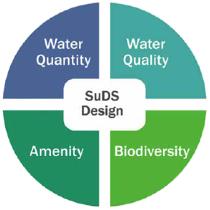Issued: June 2016
Six months on from its release, it is still early days for the latest CIRIA SuDS manual and associated non-statutory guidance. Wales is leading the way in their holistic approach to its use.
Why is the SuDS manual important?
Sustainable drainage systems (SuDS) in developments are essential for a sustainable future.
The SuDS manual provides both high-level and detailed information across the entire SuDS philosophy. It is the single go-to guide for practitioners for any drainage strategy, including advice on retro fitting SuDS into existing developments.
The SuDS manual divides SuDS design into four key categories of concern:
- Water quantity
Crucial to managing flood risk and estimated using our ReFH 2 software. - Water quality
Protecting ground water from pollution. - Amenity
Creating and sustaining better places for people. - Biodiversity
Creating and sustaining better places for nature.
The SuDS manual is enabling us to deliver sustainable and cost-effective solutions to our clients.
What is Wales doing right?
The Welsh Government has taken a proactive approach, and a holistic one.
Strengthened by a consultation process in 2015, they have published recommended non-statutory guidance that gives equal emphasis to all four categories in the SuDS manual.
They have identified that SuDS will contribute to achieving the high-level goals of the Future Generations (Wales) Act 2016 – the well-being of Wales, socially, economically, environmentally and culturally. They are also considering whether to commence the Flood and Water Management Act 2010 (Schedule 3), which will require all new developments to include SuDS features that comply with national standards.
To ensure SuDS adoption and maintenance, the Welsh Government is emphasising early design and pre-planning consultation with the regulator.
The last word
We are reassured by our positive experience in Wales.
Currently the non-statutory guidance in England (published by DEFRA) keeps the focus on water quantity alone and as yet there is no detailed information on who will be responsible for adoption and maintenance of SuDS.
We look forward to broader guidance in England in the future.